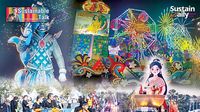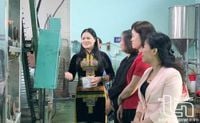In a world increasingly aware of climate change and its effects, the call for a low-carbon lifestyle has never been more urgent. With the Thai New Year, or Songkran, just around the corner, many are looking for ways to celebrate while also being mindful of their environmental impact. Experts suggest that the festivities can be an ideal time to adopt sustainable practices that can last throughout the year.
The first step towards a low-carbon lifestyle is adjusting one’s mindset. Acknowledging that individuals contribute significantly to carbon emissions—up to two tons per person annually—can be eye-opening. Tools like the Net Zero Man app can help individuals calculate their carbon footprint and understand the scale of their impact.
Next, it’s essential to adapt behaviors. Although shifting to a low-carbon lifestyle may feel challenging at first, experts believe that with consistent practice, it can become a fulfilling habit. The goal is to live in a manner that not only reduces harm to the planet but also enhances personal well-being.
Transportation is a critical area for improvement. With many people traveling during Songkran, considering the carbon footprint of travel options is vital. Different vehicles emit varying levels of carbon, and even airlines now offer low-carbon flight options. While biking everywhere may not be feasible, utilizing public transport or carpooling can significantly lower carbon emissions.
Food choices also play a significant role in one’s carbon footprint. Meat production is known to generate more carbon emissions than plant-based foods. As such, many are turning to vegan diets or opting for local produce to minimize transportation emissions. Eating locally sourced food not only supports local economies but also reduces the carbon footprint associated with long-distance transport.
Accommodation choices during the holidays can also reflect a commitment to sustainability. Travelers are encouraged to consider eco-friendly hotels that meet sustainability standards, such as those certified by LEED. These establishments typically utilize renewable energy, recycle materials, and manage waste responsibly, contributing to a greener planet.
Engaging in community activities can further enhance the experience. By participating in local cultural events, travelers can learn more about the area while supporting local artisans and businesses. This approach not only fosters cultural exchange but also helps reduce economic disparities.
As individuals prepare for a more environmentally conscious lifestyle, practical steps can include using personal water bottles, bringing reusable bags, and minimizing plastic consumption. These small changes can collectively lead to significant reductions in waste and carbon emissions.
Moreover, as the water crisis looms, understanding both carbon and water footprints is becoming increasingly vital. Water conservation practices should be emphasized during the Songkran celebrations, reminding everyone of the value of this precious resource.
By adopting these eight strategies, individuals can kickstart their journey toward a sustainable lifestyle during this festive season. It’s a chance to reflect on personal habits and make conscious choices that contribute to a healthier planet. Starting now not only sets a positive tone for the year ahead but also honors the spirit of Songkran by promoting goodwill and responsibility toward the environment.
In a related development, the Department of Agricultural Extension in Thailand recently organized a technology field day aimed at educating farmers on modern agricultural practices. This initiative, held on April 14, 2025, brought together farmers from nine eastern provinces to learn about sustainable mango and durian production.
The event, attended by Mr. Rapeepat Chansriwong, Director-General of the Department of Agricultural Extension, emphasized the importance of adopting innovative agricultural technologies to enhance productivity and market access. Mr. Chansriwong noted that climate change is increasingly impacting agricultural practices, necessitating a shift towards more sustainable methods.
During the field day, various learning stations showcased advancements in mango and durian farming, with a focus on sustainable practices. The event featured eight learning stations and 17 agricultural businesses, providing farmers with valuable insights into modern farming techniques.
Mr. Songkran Thanammattha, a representative from the Regional Agricultural Extension Center, highlighted the significance of group farming and the adoption of smart agricultural practices. He noted that using modern irrigation systems has resulted in increased yields, demonstrating the effectiveness of these new methods.
The field day not only served as a platform for knowledge exchange but also aimed to address challenges faced by farmers in the region. By incorporating feedback from farmers, the Department of Agricultural Extension plans to continue supporting sustainable agricultural practices moving forward.
As more than 800 women in Thai Nguyen province have received support for startup initiatives, the emphasis on entrepreneurship among women is also gaining traction. Since 2560, various programs have been implemented to encourage women to start their businesses, particularly in the agricultural sector. The "Women's Startup Day" project aims to promote local agricultural products and support women in entrepreneurship.
With the establishment of cooperative groups and training programs, women are being equipped with the necessary skills and knowledge to thrive in their ventures. This movement not only empowers women but also contributes to local economies and sustainable agricultural practices.
In conclusion, as Thailand celebrates Songkran, the integration of low-carbon practices into everyday life and agricultural innovation offers a promising path toward sustainability. By embracing these changes, individuals and communities can work together to protect the environment while fostering economic growth and social equality.





